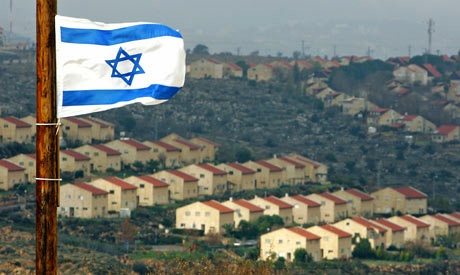
An Israeli flag fluttering over a view of the Israeli occupied Palestinian West Bank settlement of Ofra. (Reuters)
International condemnation of Israel's unremitting construction of illegal settlements in the occupied Palestinian territories is being shrugged off by Prime Minister Binyamin Netanyahu's government.
The Israeli ministry of construction, according to Palestinian legal sources, is going ahead with plans to build and sell new units in the occupied West Bank, including East Jerusalem.
On Friday, UN Secretary-General Ban Ki-moon called the construction of Israeli settlements in the occupied Palestinian territories illegal and harmful to diplomatic attempts to promote a peace deal between the government of Israel and the Palestinian Authority.
"Settlements in the occupied Palestinian territory are illegal under international law, contravene the Road Map obligations of Israel, undermine confidence, prejudge the outcome of the permanent status negotiations and hamper efforts at bringing the parties back to the negotiating table," he told a UN committee dealing with Palestinian issues on Friday
The UN secretary-general's statement came as the US moved to obstruct an Arab diplomatic démarche to table a resolution before the UN Security Council to qualify the intransigent settlement-building policy of the Netanyahu government as an impediment to peace.
It also came amid warnings from legal and humanitarian organisations over the construction of unlicensed units in the West Bank.
"Settlements are a very serious issue because when Israel build settlements it does not only exercise the illegal acquisition of occupied territories, but it also consumes natural resources, especially water, in these territories and it imposes security measures that makes it very hard if not practically impossible for Palestinian farmers to farm their lands or live peacefully in their villages," said an international humanitarian worker.
Having recently studied the situation in the West Bank, this international humanitarian worker concluded that "in some parts of the West Bank the situation is not much better than of that in the besieged Gaza".
This, he attributed to the imposed limitation on Palestinian movement by Israel through construction of the Separation Wall and of settlements.
"The wall blocks the access of Palestinian farmers to their land and the (Israeli) settlements suck away the water from the wells and leave the (Palestinian) farmers with less water than they need for the irrigation of their crops," explained the same humanitarian worker.
He added, "As a result, Palestinian farmers have to go to the settlements to buy water taken from their wells so they can irrigate their land; and then they might be confronted with Israeli government harassment or settlers violence as they try to collect their harvest".
Overall, humanitarian organisations suggest that the average water consumption for an Israeli, including a settler, is six times higher than that of a Palestinian living in the West Bank.
"This is not about water used for irrigation; it is about water used for drinking and cooking and about water used for hygiene requirements," said a member of an organisation working in the West Bank.
Meanwhile, another humanitarian worker warned that due to media attention being "almost predominantly" concentrated on Gaza, Israel is "get[ing] away with its plans to fragment the West Bank and to gather Palestinians in areas with the most limited natural resources".
In his analysis, Israeli tactics to get the Palestinians to leave their lands and to "move elsewhere within the West Bank" or out of the Palestinian Territories altogether, are very obvious: deny Palestinians access to their farms and to sufficient water resources; subject Palestinians to harassment from Israeli authorities and from the settlers; and refuse to help the Palestinian Authority to improve the situation.
Short link: